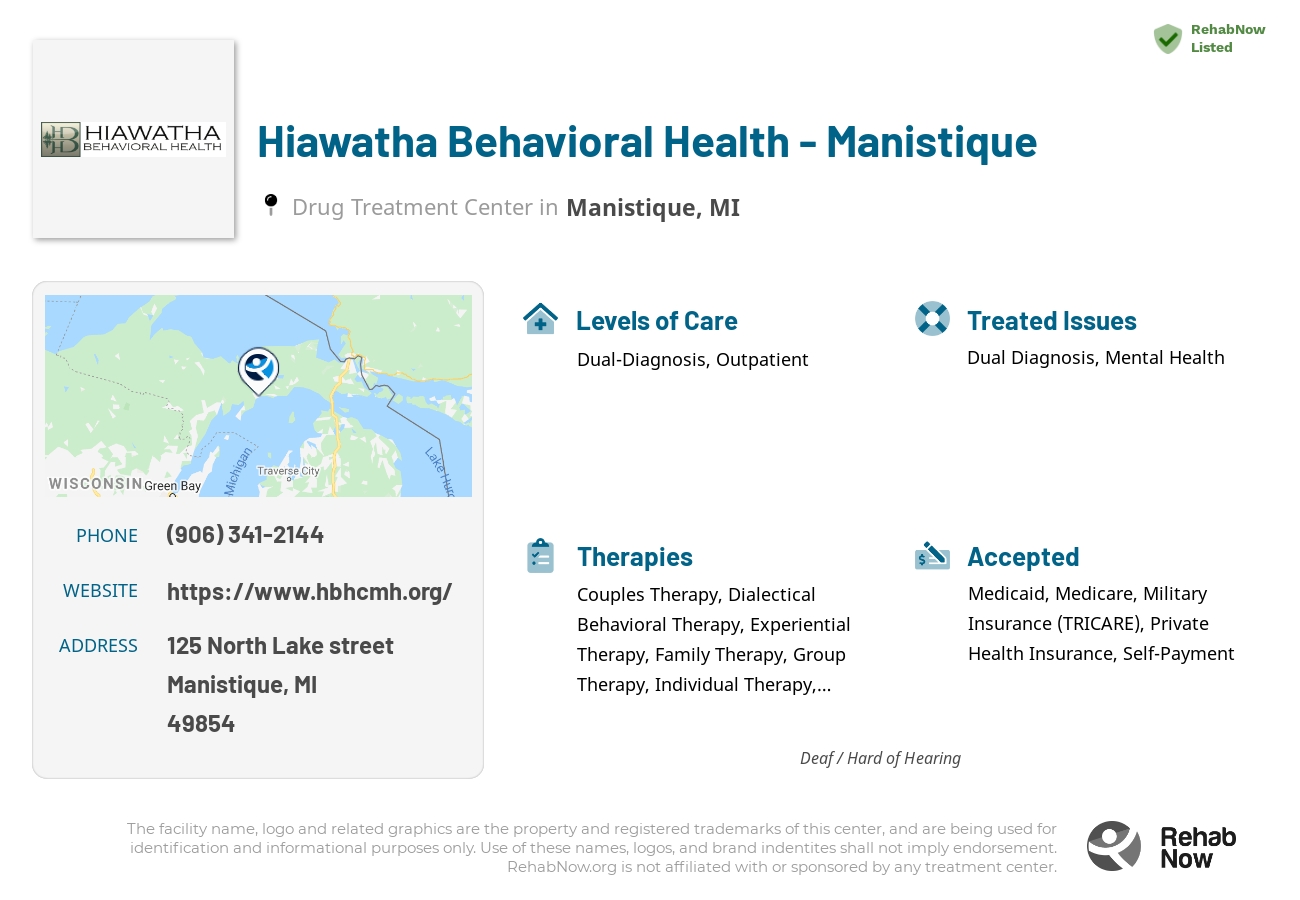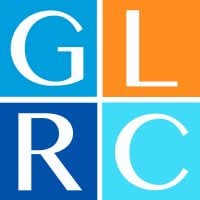Hiawatha Behavioral Health - Manistique
Drug Rehab Center in Manistique, Michigan
Hiawatha Behavioral Health - Manistique in Manistique, Michigan is an accredited addiction treatment facility that offers a wide range of programs and services, including evidence-based therapies, to support individuals suffering from addiction, dual diagnosis, mental health, alcoholism, drug addiction, and substance abuse.
About This Michigan Facility
Hiawatha Behavioral Health in Manistique, Michigan, focuses primarily on dual diagnosis and mental health. This public rehab facility stands out for its commitment to offering pathways toward independence and a meaningful life. It provides a comprehensive approach to addiction and mental health treatment, tailoring services to individual needs.
Accredited by CARF, Hiawatha Behavioral Health ensures high-quality care through evidence-based therapies and a broad spectrum of programs. Services include outpatient, inpatient, and detox treatments, addressing both addiction and underlying mental health issues holistically.
- Specializes in dual diagnosis, treating both mental health issues and substance abuse simultaneously.
- Offers a variety of evidence-based therapies, including cognitive behavioral therapy, to cater to individual patient needs.
- Accredited by CARF, showcasing its adherence to rigorous standards and commitment to quality care.
Hiawatha Behavioral Health treats a range of addictions and issues, including drug addiction, alcoholism, and substance abuse. Using a blend of treatment methods like dialectical behavioral therapy and motivational enhancement therapy, they offer various levels of care, including outpatient and inpatient services.
Genders
Ages
Modality
Additional
Accreditations

CARF
The Commission on Accreditation of Rehabilitation Facilities (CARF) is a non-profit organization that specifically accredits rehab organizations. Founded in 1966, CARF's, mission is to help service providers like rehab facilities maintain high standards of care.
Conditions and Issues Treated
There are different kinds of Dual Diagnosis:. A person who simultaneously experiences both a mental illness and an addiction disorder. Or, a person who experiences one or more coexisting (simultaneous) mental health conditions in addition to a primary substance use disorder.
The treatment requires a multi-disciplinary approach, it’s crucial for individuals to partner up with a healthcare provider who understands all the recovery components.
Levels of Care Offered at Hiawatha Behavioral Health - Manistique
This center offers a variety of custom treatment tailored to individual recovery. Currently available are Dual-Diagnosis, Outpatient, with additional therapies available as listed below.
The outpatient programs in Manistique, MI are for those addicted drugs or alcohol. The goal of the outpatient rehabilitation program is to make them stop abusing drugs or alcohol, reduce drug use or addictive behaviors, and become entirely sober. It is generally required to attend the outpatient program for 10-12 hours every week.
Patients can be administered on-the-spot medication to ease withdrawal symptoms such as anxiety, increased heart rate, and even depression. Groups such as Alcoholics Anonymous (AA) and Narcotics Anonymous (NA) can be used as a part of outpatient treatment to help maintain sobriety.
Therapies & Programs
People in addiction recovery can benefit from individual therapy. This type of therapy involves meeting with a therapist one-on-one. This allows for a personal and trusting relationship to be built so that the patient can be truly themselves and express any emotions they feel. Individual therapy leads to greater understanding and peace about your triggers for addiction and coping strategies to prevent relapse.
Couples therapy for drug addiction is based on the belief that addiction is a family disease. Everyone involved with an addict, not just the addict themselves, is affected by their behavior and the changes the addict goes through. The relationship also changes the addict’s significant other and has likely picked up some codependent behaviors. Codependency is a term used to describe a person obsessed with another person and their needs and feelings while neglecting their own. Addicts are usually people-pleasers, so it is understandable how one can become codependent in relationships with addicts.
Family therapy is a type of group problem-solving that aims to improve communication and relationships between the patient, their family, and sometimes friends. The main goal of family therapy for drug addiction is to create an environment where communication can occur without judgment, hostility, or blame. The therapist is with the family as they learn to communicate with each other differently, especially with the addict when s/he is using.
Group therapy sessions are held in rehab facilities, clinics, churches or community centers that offer drug addiction treatment. People who attend these groups are encouraged to voice their feelings and support other addicts in recovery. This helps group members strengthen their own recovery program while cheering on others who are struggling with sobriety.
Group therapy sessions provide recovering addicts with a chance to cope with everyday situations that many face. Group therapy sessions are held in rehab facilities, clinics, churches or community centers that offer drug addiction treatment.
People who attend these groups are encouraged to voice their feelings and support other addicts in recovery. This helps group members strengthen their own recovery program while cheering on others who are struggling with sobriety.
If you’re looking for addiction treatment, it’s important to find a facility that offers trauma therapy. This type of therapy helps people process and understand the past traumas that have led to their addiction. Trauma therapists will work with clients to help them understand their past and present relationships and show them that they are worthy of love. This therapy is typically done using visualization, discussion, and writing down thoughts and feelings.
Trauma Therapy is a form of therapy that involves working with a patient to help them process and understand the past trauma(s) in their life. This therapy is typically done using techniques such as visualization, discussion, and writing down thoughts and feelings. The main goals of trauma therapy is to help clients express their emotions and talk about what they are feeling.
Dialectical Behavior Therapy (DBT) is a form of cognitive-behavioral therapy that helps people understand how they connect their thoughts, behaviors, and feelings. It can give them more control over their actions, effectively stopping self-harm ideations and attempts in some patients. It also helps put those with borderline personality disorder into control for managing mental struggles.
A new study has shown that DBT works for those with self-harm behaviors and addictions by giving them therapy they can relate to and understand.
Cognitive Behavioral Therapy (CBT) helps addicts identify faulty, negative thinking so that they can work together with the therapist to find healthier ways of thinking. CBT focuses on specific aspects of each person’s thinking, feeling, physiology, and behavior. It aims to identify specific problems in these areas, and create a personalized treatment strategy.
Patient Experience
Experiential Therapy at Hiawatha Behavioral Health - Manistique
Experiential Therapy allows addicts to release emotions in a safe environment. The process involves addicts painting their feelings and releasing them on a canvas. LPE – Love, Peace, and Equilibrium is one of the most popular forms of experiential therapy.
Payment Options Accepted
For specific insurance or payment methods please contact us.
Is your insurance accepted?
Ask an expert, call (888) 674-0062
Hiawatha Behavioral Health Associated Centers
Discover treatment facilities under the same provider.
- Hiawatha Behavioral Health in Sault Sainte Marie, MI
- Hiawatha Behavioral Health - Saint Ignace in Saint Ignace, MI
Learn More About Hiawatha Behavioral Health Centers
Additional Details
Specifics, location, and helpful extra information.
Manistique, Michigan 49854 Phone Number(906) 341-2144 Meta DetailsUpdated April 15, 2024
Staff Verified
Patient Reviews
There are no reviews yet. Be the first one to write one.
Manistique, Michigan Addiction Information
Michigan has the second-highest rate of drug and alcohol abuse in the nation. Heroin is linked to more than 50% of the state's hepatitis C cases. Marijuana is the drug most often associated with crimes in Michigan, followed by methamphetamines. Opioids alone are responsible for almost 20% of all drug overdose deaths in Michigan.
Manistique, Michigan, has a severe drug addiction problem. According to the National Institute on Drug Abuse, in 2016, about 8.5% of Manistique residents ages 12 and older reported using illicit drugs within the past month. From 2002 to 2015, overdose deaths increased by 675%. There are several drug treatment options available in Manistique, Michigan. The most common are residential treatment, outpatient, and 12-step programs.
Treatment in Nearby Cities
- Ionia, MI (213.5 mi.)
- Northville, MI (279.7 mi.)
- Plainwell, MI (245.2 mi.)
- Bad Axe, MI (217.9 mi.)
- Holly, MI (254.3 mi.)
Centers near Hiawatha Behavioral Health - Manistique
The facility name, logo and brand are the property and registered trademarks of Hiawatha Behavioral Health - Manistique, and are being used for identification and informational purposes only. Use of these names, logos and brands shall not imply endorsement. RehabNow.org is not affiliated with or sponsored by Hiawatha Behavioral Health - Manistique.





